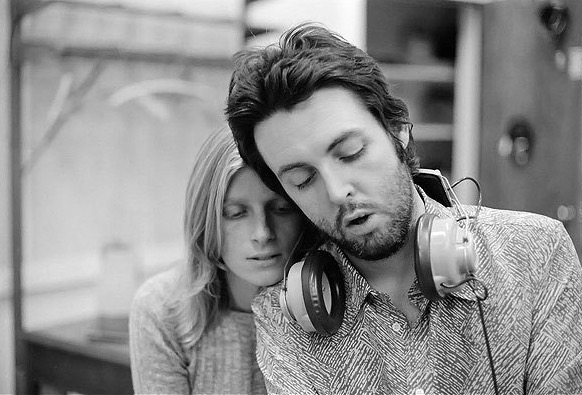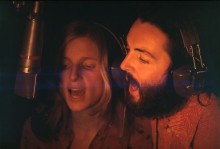Like so much of Paul McCartney’s vast post-Beatles catalogue, it took those outside of his devoted fanbase quite some time to appreciate the eccentric brilliance of 1971’s RAM. For many, me included, it remains his greatest solo achievement. Actually credited to ‘Paul & Linda McCartney’ – making it unique in the Macca oeuvre – RAM sees Paul firing on all creative and musical cylinders; from the opening strains of ‘Too Many People’ to the triumphal fade of ‘The Back Seat of My Car’, he sounds buoyant, vital and – perhaps spurred on by the lukewarm response to his first solo effort, McCartney, released a year prior – determined to deliver the goods. And boy does he deliver the goods. (Of course, some cloth-eared contemporaneous critics continued to write him off as a spent force). In fact, the album contains so many ideas it at times threatens to collapse under their weight. Each song bursts at the seams with spirited performances, inventive melodies, memorable hooks and audacious, ‘Beach Boys-on-overdrive’ vocal arrangements delivered by a heavenly stacked choir of Pauls and Lindas.
My first brush with this brilliant piece of work – or one of its most noteworthy tracks at least – came about when I was 11 or 12 and watching an episode of the classic British sitcom Only Fools & Horses one Sunday afternoon with my dad. In this particular episode, one of its central characters, the loveable Uncle Albert, goes missing after a row with his nephews Del Boy and Rodney. Their subsequent search for him is shown in a montage accompanied by a delicate ballad delivered by a rather familiar voice. ‘We’re so sorry, Uncle Albert,’ goes the refrain. ‘We’re so sorry if we caused you any pain.’
So perfectly did it accompany the scene in question that I assumed this song had been written expressly for the show, but my dad informed me it was, in fact, an old Paul McCartney song from a “cracker” album called ‘Ram’. (I remember the title struck me as oddly stark, even then.) I was already a Beatles fan by that time, but yet to explore the Fabs’ solo works, so I filed that information away at the back of my brain for safe keeping.
A few years later, I was browsing in what had become my favourite haunt, HMV on Liverpool’s Church Street. Recalling my dad’s fondness for RAM, I bought him a copy on CD, as his birthday was approaching. He was happy with it, but it wasn’t long before I sneakily assimilated it into my own burgeoning music collection, having listened to it full for the first time and been duly bowled over by what I heard. I would eventually come to own it on pretty much every possible format barring 8-track cartridge, and now consider it an old, cherished friend, always there to inspire me and to lift my spirits when I need it. It’s easily one of my ‘desert island discs’.

RAM was a marked departure from McCartney’s eponymous solo debut. McCartney had been a self-played, deliberately lo-fi, largely homespun affair, its creator seeking domestic refuge with his new family from the escalating tensions between himself and his then bandmates. By the time the New York-based sessions for its follow-up rolled around, however, The Fabs were no more and, though still embroiled in litigation with Beatles manager Allen Klein and his former colleagues, McCartney was on a creative hot streak, and bursting with ideas far too expansive to be realised on his trusty Studer 4-track alone.
Recording at CBS and Phil Ramone’s A&R Studios in midtown Manhattan from January to March 1971, McCartney had – via a series of top secret auditions – assembled a muscular backing band of crack session players to help bring the music to life, the core of which consisted of drummer Denny Seiwell (later to join Wings) and first-call guitarists Hugh McCracken and David Spinozza. No less than the New York Philharmonic would supply orchestral overdubs for the likes of ‘Uncle Albert/Admiral Halsey’ and ‘The Back Seat of My Car’.
The material is, for the most part, a typical Macca mix of guitar-fuelled rockers (‘Eat at Home’, ‘Smile Away’, ‘Too Many People’), folky acoustic ditties (‘Heart of the Country’), music-hall whimsy (‘Dear Boy’, ‘Uncle Albert/Admiral Halsey) and lush balladry (the closing ‘The Back Seat of My Car’) all dispatched with typical aplomb, a testament to McCartney’s musical versatility. Then there are the album’s truly uncategorisable cuts…
The barnstorming ‘Monkberry Moon Delight’ (a favourite of my dad’s, incidentally) is possibly the barmiest thing Paul’s ever committed to tape. Built around a seesawing guitar riff and pounding piano, it’s rollicking good fun, McCartney barking out artful gibberish with gleeful abandon over the band’s lolloping groove; his ad libs during the fade out in particular are as free of inhibition as it’s possible to be and it’s exhilarating to behold. In its own demented way, ‘Monkberry Moon Delight’ might well be one of his greatest moments on record.
Another endearing curio is the beguiling ‘Ram On’, Paul softly urging the listener to ‘give your heart to somebody soon, right away’ over a simple ukulele vamp, some ambient electric piano, haunting backing vocals, and a simple rhythm track made up of kick drum, echo-drenched handclaps and the sound of a foot (possibly his own) stamping on the wooden studio floor. Like ‘Monkberry Moon Delight’, there’s nothing else that sounds like it in Macca’s catalogue, which further exemplifies just how adventurous and inspired he was during this period. According to its author, the song’s point of origin was the back of a New York cab during one of his many journeys to and from the studio; the ukulele’s portability meant he could take one wherever he went in case inspiration struck.

In the best possible sense, it’s pure, undiluted Macca, not to mention an enduring musical portrait of arguably the strongest marriage in rock.
The charming ‘Uncle Albert/Admiral Halsey’ deftly fuses a number of song fragments into something approaching a mini-suite. It’s expertly arranged and performed, and as good a showcase of its author’s enviable melodic gifts as anything in his songbook. McCartney’s critics have tended to use his music hall inclinations and fondness for the whimsical as a stick with which to beat him, but ‘Uncle Albert/Admiral Halsey’ strikes the perfect balance of those elements, as does the track that precedes it, the quite scintillating ‘Dear Boy’.
In promoting the record – and in interviews since – McCartney was at pains to point out Linda’s pivotal role in its creation, and with very good reason. Credited as co-author on every song, how the writing was actually divided up between the couple is unclear, but Linda’s unique voice and striking vocal blend with Paul is inarguably a crucial component in RAM’s overall sonic canvas. By her own admission not the most accomplished singer, she throws herself into her suddenly expanded role with gusto and negotiates RAM‘s hugely complex vocal arrangements with admirable skill. Paul would confess later that he was a pretty tough taskmaster during these sessions and really put Linda through her paces, but the results speak for themselves, and one can’t help but wonder why he never again utilised her voice to quite the same degree on any of his subsequent records.
Though the tracks highlighted thus far make for quirkier fare, RAM is not found wanting in the pure, balls-out rock department either. McCracken and Spinozza’s electric guitar work is exceptional on songs like the raucous ‘Smile Away’ and the Buddy Holly-inspired ‘Eat at Home’ respectively, and McCartney’s own distinctive licks are discernible on a number of cuts. Yet there’s also a considerable lightness of touch shown in the acoustic material, not to mention the Chet Atkins-inspired finger-picking that drives ‘Heart of the Country’, McCartney’s wistful paean to the virtues of rustic living. (Paul’s inspired bass playing throughout also deserves an honorary mention.)
RAM’s lyrical content notably drew the ire of one John Ono Lennon, who perceived several songs on the record – particularly ‘Too Many People’ and ‘3 Legs’ – to contain a number of broadsides aimed at Yoko and himself. Paul denied this for the most part, but did admit to having the Lennon’s recent high-profile activism in mind when he penned the line ‘too many people preaching practices, don’t let ’em tell you what you wanna be’ for ‘Too Many People’. His former collaborator responded with a series of barbed comments in the music press, not to mention the infamously spiteful ‘How Do You Sleep?’, included on the same year’s Imagine album, which also spoofed RAM’s cover photo (Paul holding an actual ram by the horns) by including a picture of John on its back cover grabbing a pig by the ears.
There is, of course, lots to enjoy amongst McCartney’s staggeringly prolific 70s output (and beyond), but with the exception of 1973’s Band On The Run, it’s arguable that none of his records from that period hang together quite so well, or are executed with such verve, panache and sheer joy in the act of creation as RAM. In the best possible sense, it’s pure, undiluted Macca, not to mention an enduring musical portrait of arguably the strongest marriage in rock. Half-a-century on from its release, it doesn’t sound like it’s aged a day. If you’ve not yet had the pleasure…well, firstly I envy you; secondly, procure a copy by fair means or foul, stick it on, and smile away…
Oh, and thanks for the heads up, dad.
-Brian













Soraya May 15, 2021
Lovely. What a glowing and beautifully contextualised breakdown of the album (which I am entirely unfamiliar with). I’ll listen today.
Once again, your dad would be proud Brian x